| "Mr. Palmer's temper might perhaps be a little soured by finding, like many others of his sex, that through some unaccountable bias in favour of beauty, he was the husband of a very silly woman—but she knew that this kind of blunder was too common for any sensible man to be lastingly hurt by it." -- Elinor Dashwood's thoughts in Sense & Sensibility |
| Jane Austen might have declared in Northanger Abbey that men prefer ignorance, if not outright imbecility in women, but elsewhere she pokes gentle fun at ignorant women. There's her description of Catherine Morland's chaperone in Bath: "Mrs. Allen was one of that numerous class of females, whose society can raise no other emotion than surprise at there being any men in the world who could like them well enough to marry them. She had neither beauty, genius, accomplishment, nor manner." And: "the remarks and ejaculations of Mrs. Allen, whose vacancy of mind and incapacity for thinking were such, that as she never talked a great deal, so she could never be entirely silent; and, therefore, while she sat at her work, if she lost her needle or broke her thread, if she heard a carriage in the street, or saw a speck upon her gown, she must observe it aloud, whether there were anyone at leisure to answer her or not." |
|
Emma counters that "Harriet...is not a clever girl, but she has better sense than you are aware of, and does not deserve to have her understanding spoken of so slightingly..." She goes on to argue that most men are not interested in intellect in their wives anyway, they are attracted to beauty and "sweetness of temper."
“Upon my word, Emma, to hear you abusing the reason you have, is almost enough to make me think so too," [Mr. Knightley retorts.] "Better be without sense, than misapply it as you do."
| “But I am a sad weak creature—don’t you think I am, my Lord?” [says Lady Louisa after declining an offer to go for a walk] “O, by no means, (answered he), your Ladyship is merely delicate; --and, devil take me, if ever I had the least passion for an Amazon.” “I have the honour to be quite of your Lordship’s opinion, (said Mr. Lovel, looking maliciously at Mrs. Selwyn); for I have an insuperable aversion to strength, either of body or mind, in a female.” “Faith, and so have I, (said Mr. Coverley); for, egad, I’d as soon see a woman chop wood, as to hear her chop logic.” "So would every man in his senses,” said Lord Merton, “for a woman wants nothing to recommend her but beauty and good-nature; in every thing else she is either impertinent or unnatural. For my part, deuce take me if ever I wish to hear a word of sense from a woman as long as I live!” “It has always been agreed,” said Mrs. Selwyn, looking round her with the utmost contempt, “that no man ought to be connected with a woman whose understanding is superior to his own. Now I very much fear, that to accommodate all this good company, according to such a rule, would be utterly impracticable….” |
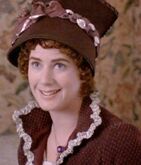
In Sense and Sensibility, when Elinor tries to resign herself to Edward Ferrars' marriage to Lucy Steel, she argues that Lucy is intelligent: "Lucy does not want sense, and that is the foundation on which every thing good may be built... he will marry a woman superior in person and understanding to half her sex; and time and habit will teach him to forget that he ever thought another superior to her.”
Other leading men in novels of this time agree with Mr. Knightley--men of sense do not want silly wives. They do not find imbecility or ignorance charming. In The Denial (1790), the hero refuses to marry an heiress--though she is the choice of his father--because of her ignorance, an ignorance he discovers during his first formal visit with her:
| “Pray, Ma’am, said I,” “which is your favourite amongst the modern Dramatic Authors?” She fixed her eyes on me, but made no reply. After a serious pause of some seconds, she answered, “Pray Sir, what are they?” Amazement struck me almost speechless, when I reflected that a young lady of the age of twenty, with a fortune of fifty or sixty thousand pounds, should betray such total ignorance on a subject which is not unknown even to many children at school. Despairing of success on a topic of literature, I asked her… what was her opinion of the new dresses exhibited on the last Court-day, as they were detailed to us in the public prints? I had scarcely finished my question, when her countenance brightened, and she displayed so intimate a knowledge…. |
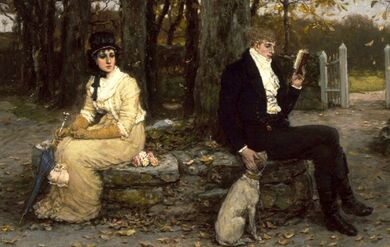 The Waning Honeymoon (detail)
The Waning Honeymoon (detail) In A Tale of Warning or, The Victims of Indolence (1814), an army officer marries a beautiful girl on short acquaintance only to discover she is poorly educated and only wants to read novels. She thinks that adult married life will be like a romance novel. After the honeymoon, "When her husband ceased to address her like a hero of romance, and wished to converse rationally, she had nothing to say...."
In Coraly (1819), Major De Montford finds himself falling for a poor clergyman's daughter, not just because of her beauty but because of her mind: “He could scarcely believe that the lovely unadorned girl whom he met in her morning walks, with a straw hat and linen gown… was the same intelligent being who could in the evening converse with her father, with a clearness of understanding, and a degree of knowledge, which soon accounted to De Montford why that father was so well contented with no other companion.”
In Maria Edgeworth's Belinda (1801), Clarence Hervey realizes that his friend Belinda is the girl he really wants to marry: "In comparison with Belinda, [his ward] Virginia appeared to him but an insipid, though innocent child; the one he found was his equal, the other his inferior; the one he saw could be a companion, a friend to him for life, the other would merely be his pupil, or his plaything. Belinda had cultivated taste, an active understanding, a knowledge of literature, the power and habit of conducting herself; Virginia was ignorant and indolent, she had few ideas, and no wish to extend her knowledge…” This realization dashes cold water on his marriage plans because “a wife without capacity or without literature could never be a companion suited to him, let her beauty or sensibility be ever so exquisite and captivating.”
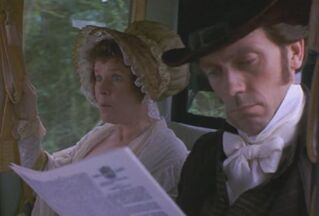 Mr. and Mrs. Palmer, one of Austen's mismatched couples, in Ang Lee's Sense & Sensibility
Mr. and Mrs. Palmer, one of Austen's mismatched couples, in Ang Lee's Sense & Sensibility Charles, the protagonist of the best-selling Coelebs in Search of a Wife, rejects all the shallow London sophisticates he meets in his search. “How dull do we find it, when civility compels us to pass even a day with an illiterate man? Shall we not then delight in the kindred acquirements of a dearer friend? Shall we not rejoice in a companion who has drawn, though less copiously, perhaps, from the same rich sources with ourselves; who can relish the beauty we quote, and trace the allusion at which we hint?... a man of taste who has an ignorant wife, cannot, in her company, think his own thoughts, nor speak his own language... He must be continually lowering and diluting his meaning, in order to make himself intelligible. This he will do for the woman he loves, but in doing it he will not be happy."
Charles warns that other serious consequences arise when a wife can't understand her husband: "She, who cannot be entertained by his conversation, will not be convinced by his reasoning…” This is reminiscent of the passage in Mansfield Park when Sir Thomas attempts to persuade Lady Bertram that it is right and proper for Fanny to go to Portsmouth to see her family. She submits, but she is not convinced:
| But he was master at Mansfield Park. When he had really resolved on any measure, he could always carry it through; and now by dint of long talking on the subject, explaining and dwelling on the duty of Fanny’s sometimes seeing her family, he did induce his wife to let her go; obtaining it rather from submission, however, than conviction, for Lady Bertram was convinced of very little more than that Sir Thomas thought Fanny ought to go, and therefore that she must. In the calmness of her own dressing-room, in the impartial flow of her own meditations, unbiassed by his bewildering statements, she could not acknowledge any necessity for Fanny’s ever going near a father and mother who had done without her so long, while she was so useful to herself. |
“Yes, very well." Edmund answers, but he prefers women of superior intellect. The Miss Owens are "[p]leasant, good-humoured, unaffected girls. But I am spoilt, Fanny, for common female society. Good-humoured, unaffected girls will not do for a man who has been used to sensible women. They are two distinct orders of being. You and Miss Crawford have made me too nice.”
Finally, given the disparities in education between boys and girls, marrying someone with whom you can't have a serious, rational conversation must have been the fate of many men in Austen's time, or as she sarcastically put it, "this kind of blunder was too common for any sensible man to be lastingly hurt by it."
A genteel education might be appropriate for the heroine of a novel, but it wasn't appropriate for a girl lower down on the social rung--that only led to trouble. Social class and education is the topic of the next post.
| In the final volume of my Mansfield Trilogy, we meet Portia Owen, one of the three Owen sisters, who has been carrying a torch for Edmund. Click here for more about my novels. Podcasters Harriet and Ellen point out that Jane Austen portrayed several less-than-ideal marriages where there was a disparity between the intellect of the husband and wife. Mr. Bennet in Pride & Prejudice, Mr. Palmer in Sense & Sensibility, and Sir Thomas in Mansfield Park all marry women whose understanding and information is much inferior to theirs. Of the three husbands, only Sir Thomas "treats Lady Bertram with absolute respect." Unlike Mr. Bennet and Mr. Palmer, he never belittles her in front of others. The intellect and discrimination of Austen heroines is such that they tend to be intellectually isolated. When Fanny Price goes in the barouche to Sotherton, "She was not often invited to join in the conversation of the others, nor did she desire it. Her own thoughts and reflections were habitually her best companions." I should have used that quote in my guest post on the "Isolation of the Austen Heroine."
Previous post: The Misfortune of Knowing Something Next post: Your Station in Life |
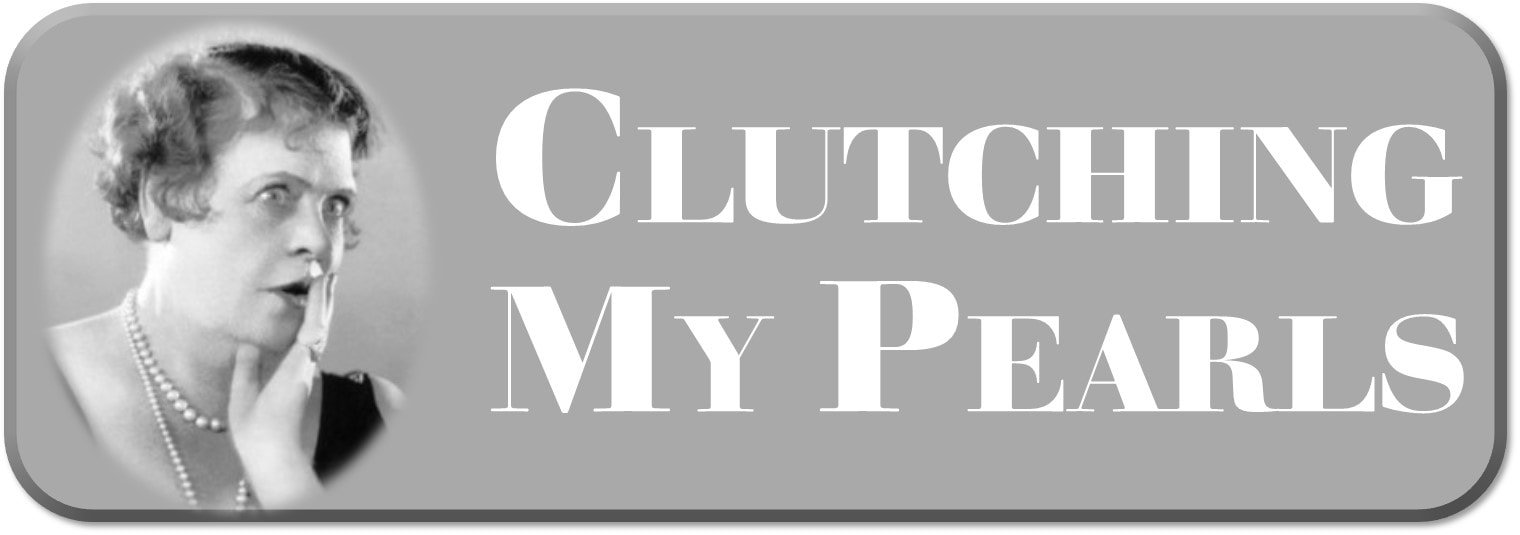
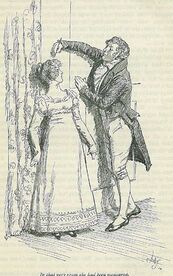
 RSS Feed
RSS Feed